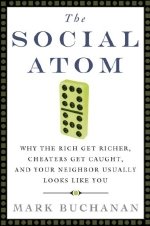I've never read any professional pundit who is quite so consistently surprising as David Brooks. He ranges from the ridiculous (as, for example, his recent attack on Al Gore) to the sublime, as in his essay today on the nature of human decision making, its deep roots in biology, and why it's long been a mistake (of both left and right) to think that just giving people (such as teenagers living in broken homes and difficult neighborhoods) more information is enough for them to make good decisions. We're pushed and pulled by powerful biological factors, expressed emotionally, for which our logical brains are routinely just no match. Amen to more recognition of the mismatch.
I'm reminded of a proposal by Matthew Rabin and other economists for the notion of "asymmetric paternalism". That's a mouthful, but it's a neat idea. Conservatives often rail against regulation, arguing that it gets in the way of people, who really know best for themselves. Liberals often counter with the realistic point that many people don't make good decisions, and that some get cheated by others, and that regulation can help society come, collectively, to the right kinds of decisions. Asymmetric paternalism is the idea that the right kinds of regulations can 1) not get in the way of those sharp enough always to make the right decisions, yet 2) also help those who tend not to make the right decisons. A couple sentences from the paper's abstract:
"Asymmetrically paternalistic regulations benefit those who would otherwise make poor decisions, but impose little or no costs on those who behave optimally. As such, they challenge both opponents and supporters of regulation by setting forth a disciplined set of criteria by which to judge the costs and benefits of regulatory proposals."
I like the idea.
Friday, June 22, 2007
A dose of realism
Subscribe to:
Post Comments (Atom)




2 comments:
Love the concept of AP from the 22nd. Send it to John Stossel and Walt Williams>
My guess is that Stossel would be as unimpressed as I am.
I cannot for the life of me understand what is so 'sublime' about Brooks's piece according to Buchanan. Though the premise is sound, it's loaded with sweeping (erroneous) generalizations. Nor do I understand why Buchanan thinks Asymmetric paternalism (AP) is a 'neat idea'. It isn't an idea at all--and the abstract bears this out: it's an idea for an idea. In the abstract it's whimsy; there is nothing foundational nor defining to support it.
Buchanan, to me, seems much like he describes Brooks--ridiculous ('A dose of realism', 'State the obvious', 'Does God do anything') to sublime ('Fair weather friends', 'How do extremists prevail).
The sentences he quotes from the abstract reek of the usual we-know-best liberalist paternalism that's been a problem for decades--just with a new 'scientific'-sounding name. Buchanan does not support his 'neat idea' notion with any examples. None are provided in the abstract and he doesn't seem to have read the actual paper on which the abstract is based. Had he, he would discover that the authors are more about AP as an evaluative tool, not necessarily as a tool for policy development although they do touch on this possibility--it's the paper's most glaring weakness however. As a post facto evaluative tool it might be useful--as long as one only seeks to evaluate the circumstantial outcomes of the regulation(s) in question and not the pre-reg assessments. If one seeks to do the latter, or if one wishes to use AP to develop regs, then one is in a position no different than if one wasn't using AP, viz. one must make decisions about the real or potential actors and their rationality--fully rational? boundedly rational? irrational?--and this is, as without AP, capital-P Paternalistic and subjective. The paper betrays this, glaringly, but, I assume, unintentionally.
So, I'll challenge you :-): What, pray, tell, is so appealing here?
Post a Comment